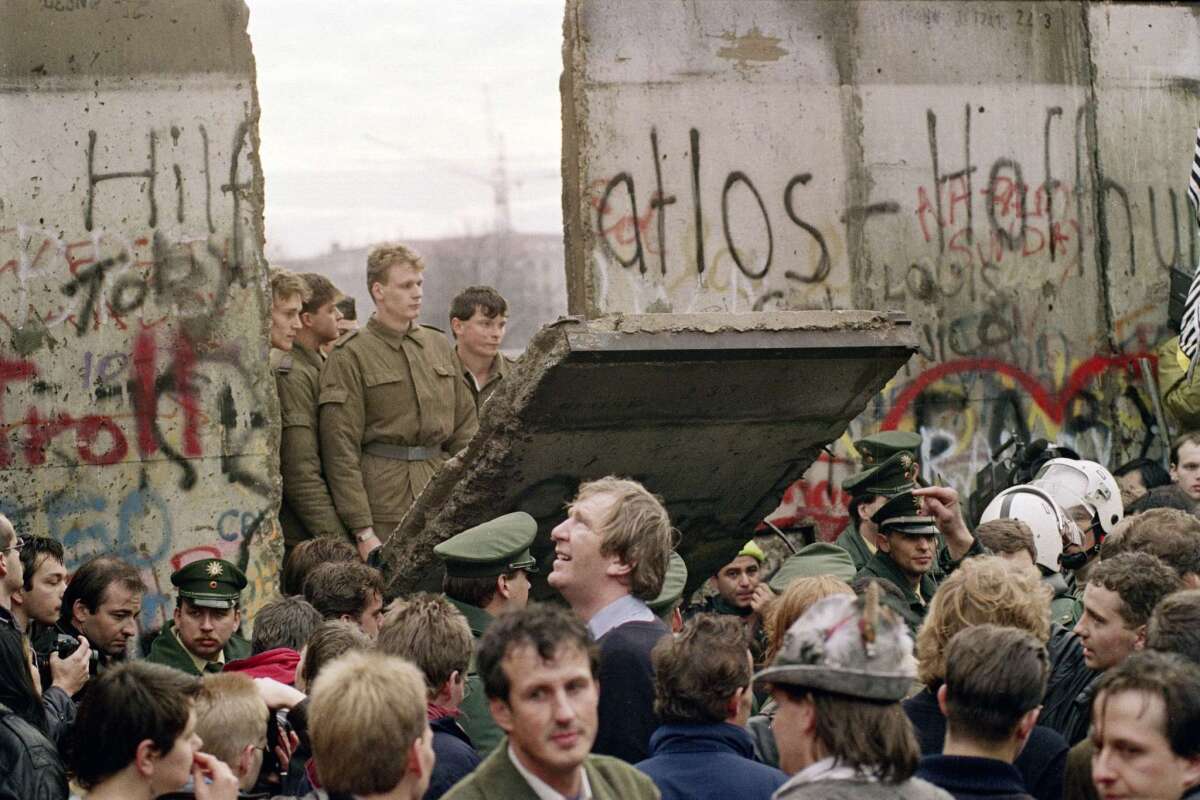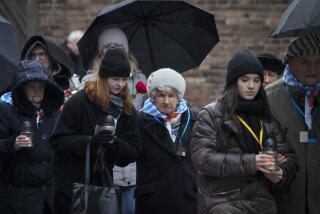Germany marks 30th anniversary of the fall of Berlin Wall, but post-Cold War gains are under threat

BERLIN — Tens of thousands of Germans and visitors from around the world converged Saturday at this once-divided city’s iconic Brandenburg Gate to celebrate the fall 30 years ago of the Berlin Wall and the end of the Cold War, even as many gains since then are today under threat.
“The Berlin Wall is now history and the lesson learned is that there are no walls high enough or wide enough to keep people out or limit freedom that cannot be torn down,” German Chancellor Angela Merkel, who grew up on the Communist eastern side of the divide, said at the gate where the 100-mile long barrier once ringed West Berlin.
Even though the 12-foot-high wall and the accompanying “death strip” — where East Germans attempting to escape the Communist side were killed by border guards — has been mostly dismantled for a longer period than the 28 years that it stood, East-West divisions remain, along with broader global challenges and disputes once thought resolved.
Amid a rise of isolationist nationalism in Europe and the United States, Merkel,who has been chancellor since 2005, said the wall “reminds us all that we have to do our part for freedom and democracy.”
At the gate on Saturday, those celebrating sang along to music and watched fireworks for the 30th anniversary.
“The values that Europe is based on, such as freedom, democracy, equality, the rule of law and safeguarding human rights, are anything but self-evident,” said Merkel, who will leave office in 2021 after her fourth term. “They have to be lived and defended again and again. This is more important today ... than ever before.”
In the days ahead of the anniversary, Secretary of State Michael R. Pompeo, while dogged by questions over the impeachment inquiry of Trump, toured remnants of the wall and guard bunkers in rural Germany where he had patrolled 30 years ago as a U.S. Army officer.
Pompeo said Saturday, after returning to Washington, that he was “amazed at how far we have come since then.” Throughout his three days in Germany, he repeatedly praised the importance of the U.S. relationship with Germany and other European countries in tackling the world’s problems, from Afghanistan and Syria to nuclear proliferation.
“The problems that Germany and the United States have taken on on behalf of the world [are] enormous,” he said on Friday, alongside Merkel at her dramatically modern offices, with a view of the Brandenburg Gate.
“We have worked together to raise billions of people out of difficult situations from authoritarian regimes, not only here in Europe but across the world,” Pompeo added. “And we should be incredibly proud of the work that we have done together and we should remind the citizens of Germany, the citizens of the United States and all across the world the power of our two countries working together.”
But many of his hosts questioned his positive assessment, noting President Trump’s disdain for the European Union, public disparaging of Merkel, criticism of NATO and withdrawal from key arms-control agreements that emerged after the Cold War as ways to keep Russia in check.
“The Atlantic has become wider,” said Thomas Paulsen, president of the Koerber Institute, a foreign-policy institute in Berlin where Pompeo delivered a speech. “Germans see a need for greater independence from the U.S. ... Are we still wunderbar together? We are stronger if we speak in one voice.”
He added, with Pompeo in the audience, that he hoped the transatlantic relationship could survive the latest “Twitter tirade.”
The transatlantic relationship is not the only area where, 30 years on, there are questions about the progress made since 1989.
Lingering divisions between East Germans and West Germans continue to haunt the country that has since emerged as Europe’s most important nation and economic powerhouse.
A recent opinion poll by the Ipsos institute showed about one in seven Germans (15%) has a negative view of the fall of the wall because of the turmoil and cost its demise caused to their lives, while another 30% have only mixed views — negative views, Ipsos noted, were linked to rising taxes and high costs related to the reunification a year later. Only a slim majority of 54% have positive views of the wall falling, the pollster said.
Another poll by the Dimap institute for ARD television found 52% of East Germans believe they have been unfairly treated and 64% believe the two Germanys have not fully grown back together, and another 15% say they haven’t grown back together at all in the ensuing three decades. There are still significant gaps in wages, pensions and levels of accumulated wealth between East and West Germany — and voting patterns are still considerably different in the east and west.
“Some people [who] thought that there would be a equalization between east and west faster are realizing now that it’s probably going to take a half century or even longer,” Merkel said in an interview published Saturday in the Sueddeutsche Zeitung newspaper. “In the first 10 or 20 years [after the Berlin Wall fell], there were hopes that things would go faster.”
Germany has also been experiencing a deeper bout of self-reflection at this year’s anniversary of the wall falling in the wake of the surprising rise of the far-right Alternative for Germany (AfD) party in recent years, which has won up to 25% of the vote in some formerly communist eastern states.
The AfD’s strident anti-foreigner policies and populist slogans have caught on especially in eastern Germany, where income levels are generally lower and there is far less accumulated property and wealth than the West after a half century of communism.
“I realize the upheaval was far more dramatic for the people in the East than for us in the West after the wall fell,” said Berlin Mayor Michael Mueller in a speech Friday in a nod to one of the main complaints of easterners. “We’ve accomplished a lot in the last 30 years, but the work is far from done. We’ve made a lot of mistakes in these last 30 years and we haven’t succeeded in overcoming all the differences between East and West. It’s disappointing. We’ve got to acknowledge that and keep working hard to create a common standard of living across all of Germany.”
Mueller nevertheless urged everyone to celebrate what happened 30 years ago Saturday.
“Berlin and Germany — go out and celebrate all that you’ve accomplished over these last 30 years,” Mueller said.
Monika Gruetters, Germany’s culture minister, said in an interview with a small group of U.S. journalists that Germany would never forget the leading role played by the United States — and especially Presidents Ronald Reagan and George H.W. Bush — that contributed to the fall of the wall and the later reunification of Germany.
“I think Reagan and Bush, and also [West German Chancellor Helmut] Kohl had a vision and belief in the goal,” Gruetters said.
Pompeo, in his visit, unveiled a statue of Reagan at the U.S. Embassy in Berlin, praising his prescience and influence in the collapse of communism.
Gruetters added about the wall falling: “That was one of the happiest moments in German history. Even when remembering now with films and speeches we want to start crying because it was such a happy moment. It was a peaceful revolution, without any bloodshed. That’s why we are a little bit proud that despite our terrible history to have this moment as well.”
The Berlin Wall was quickly built in August 1961 to stop East Germans fleeing to the West. It began as a barbed wire and cinder block wall and was later fortified as a heavily guarded white concrete barrier that encircled West Berlin and effectively imprisoned 17 million East Germans by cutting off their one last open gate to the West.
Communist regimes collapsed in the face of the popular uprisings across Eastern Europe in 1989 — signaling the end of the Cold War. The Berlin Wall had been the most dramatic symbol of the Cold War.
At least 139 people were killed trying to escape to West Berlin and many who were captured in foiled attempts ended up serving long jail terms.
Trump on Saturday congratulated Germany, saying in a statement issued by his office that “courageous men and women from both East and West Germany united to tear down a wall that stood as a symbol of oppression and failed socialism for more than a quarter of a century.”
“The United States and our allies and partners remain steadfast in our unwavering allegiance to advancing the principles of individual liberty and freedom that have sustained peace and spawned unparalleled prosperity,” he added.
More to Read
Sign up for Essential California
The most important California stories and recommendations in your inbox every morning.
You may occasionally receive promotional content from the Los Angeles Times.











